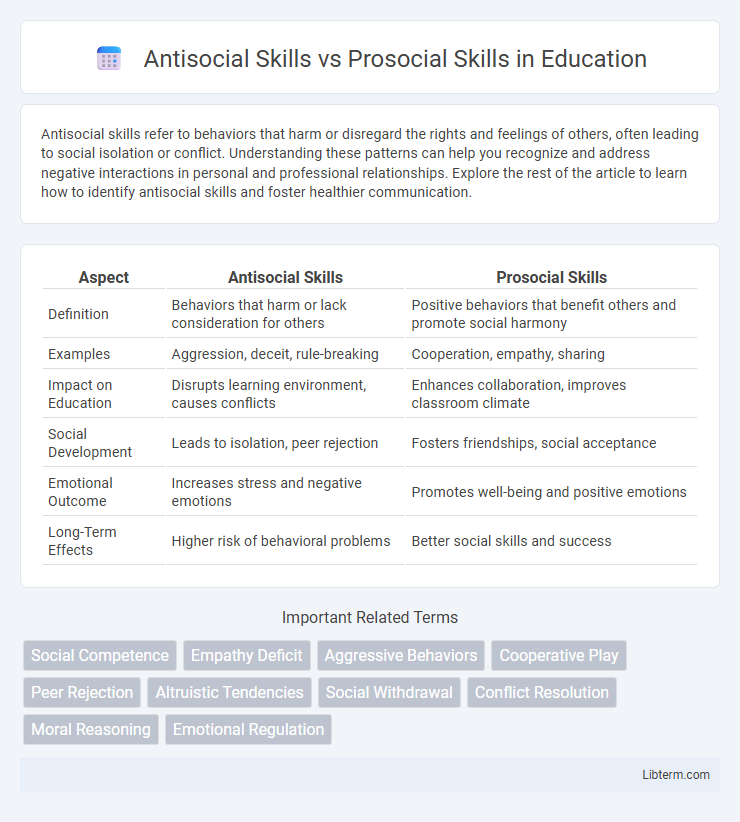Antisocial skills refer to behaviors that harm or disregard the rights and feelings of others, often leading to social isolation or conflict. Understanding these patterns can help you recognize and address negative interactions in personal and professional relationships. Explore the rest of the article to learn how to identify antisocial skills and foster healthier communication.
Table of Comparison
| Aspect | Antisocial Skills | Prosocial Skills |
|---|---|---|
| Definition | Behaviors that harm or lack consideration for others | Positive behaviors that benefit others and promote social harmony |
| Examples | Aggression, deceit, rule-breaking | Cooperation, empathy, sharing |
| Impact on Education | Disrupts learning environment, causes conflicts | Enhances collaboration, improves classroom climate |
| Social Development | Leads to isolation, peer rejection | Fosters friendships, social acceptance |
| Emotional Outcome | Increases stress and negative emotions | Promotes well-being and positive emotions |
| Long-Term Effects | Higher risk of behavioral problems | Better social skills and success |
Understanding Antisocial and Prosocial Skills
Antisocial skills involve behaviors that are hostile, disruptive, or violate social norms, such as aggression, manipulation, and deceitfulness, often leading to negative interpersonal consequences. Prosocial skills encompass positive social behaviors like empathy, cooperation, communication, and helping others, which foster healthy relationships and social harmony. Understanding the distinct cognitive, emotional, and behavioral patterns underlying antisocial versus prosocial skills is crucial for developing interventions that promote adaptive social functioning and reduce maladaptive behaviors.
Defining Antisocial Skills: Traits and Behaviors
Antisocial skills encompass behaviors and traits characterized by disregard for social norms, manipulation, deception, and a lack of empathy. Individuals exhibiting antisocial skills often engage in aggressive actions, violate others' rights, and display a pattern of hostility or impulsivity. These traits contribute to difficulties in forming healthy relationships and maintaining societal rules.
Key Characteristics of Prosocial Skills
Prosocial skills encompass empathy, effective communication, cooperation, and conflict resolution, enabling individuals to build trusting and supportive relationships. These skills foster positive social interactions and enhance group cohesion, promoting emotional intelligence and community well-being. Mastery of prosocial behaviors leads to increased social acceptance and collaborative problem-solving abilities.
The Psychological Roots of Antisocial Behaviors
Antisocial behaviors originate from complex psychological roots often linked to early childhood trauma, attachment disorders, and neurodevelopmental imbalances affecting empathy and impulse control. Dysfunction in brain regions such as the amygdala and prefrontal cortex plays a critical role in the emergence of antisocial traits, impairing emotional regulation and social cognition. Understanding these underlying mechanisms is essential for differentiating antisocial skills from prosocial behaviors, which are driven by positive social reinforcement and healthy emotional development.
Social Benefits of Developing Prosocial Skills
Developing prosocial skills enhances empathy, cooperation, and effective communication, leading to stronger interpersonal relationships and increased social support. Individuals with prosocial behaviors experience greater acceptance within communities and improved conflict resolution abilities. These social benefits contribute to improved mental health, higher self-esteem, and overall well-being.
Antisocial Skills in Childhood and Adolescence
Antisocial skills in childhood and adolescence often manifest as aggressive behaviors, defiance, and lack of empathy, contributing to social isolation and academic difficulties. These behaviors can disrupt peer relationships and increase the risk of developing conduct disorders or antisocial personality traits later in life. Early interventions targeting emotional regulation and social problem-solving have proven effective in reducing antisocial tendencies and promoting healthier social interactions.
Strategies to Encourage Prosocial Development
Promoting prosocial skills involves implementing strategies such as modeling positive behavior, reinforcing empathy, and providing opportunities for cooperative activities. Structured social skill training programs and consistent positive feedback help children and adults internalize and practice sharing, helping, and cooperation. Creating supportive environments that encourage perspective-taking and emotional regulation fosters the development of lasting prosocial behaviors.
Impact of Antisocial Behaviors on Relationships
Antisocial behaviors, such as aggression, deceit, and withdrawal, significantly impair the quality of interpersonal relationships by fostering mistrust and conflict. These behaviors reduce empathy and cooperation, leading to social isolation and difficulties in forming meaningful connections. In contrast, prosocial skills promote positive interactions and emotional bonds, highlighting the detrimental effects of antisocial tendencies on relational health.
Measuring and Assessing Social Skillsets
Measuring and assessing antisocial and prosocial skills requires validated tools such as behavioral checklists, self-report questionnaires, and observational methods that capture frequency, intensity, and context of social interactions. Key metrics include empathy levels, cooperation, aggression, conflict resolution abilities, and adherence to social norms, which distinguish prosocial behaviors from antisocial tendencies. Advanced assessment technologies like social simulation tasks and neuropsychological evaluations provide objective data to tailor interventions for improving social skillsets.
Nurturing Prosocial Skills Across Lifespan
Nurturing prosocial skills across the lifespan enhances empathy, cooperation, and effective communication, which are essential for building strong social bonds and community engagement. Early childhood interventions, such as social-emotional learning programs, significantly increase prosocial behaviors by teaching sharing, helping, and conflict resolution strategies. Lifelong practice and reinforcement through positive role models and social environments support the continued development of prosocial skills, reducing antisocial tendencies and promoting psychological well-being.
Antisocial Skills Infographic

 libterm.com
libterm.com